![Harmony [logo]](i/logo.png)
![Harmony [logo]](i/print_logo.png)

A key sustainability objective over the past four years has been the recruitment, development and retention of its employees through the various training, development and reward initiatives. The company manages the performance and careers of employees on a regular basis throughout the group.
- Home <
- Social performance <
- Labour practices and human rights
In this section
- Safety
- Occupational health and employee well-being
- Labour practices and human rights
- Working with our communities
- Product responsibility
Labour practices and human rights
Material labour and human rights indicators
There are three primary material issues in respect of Harmony's sustainability as an employer, namely:
- Recruiting, developing, managing and retaining employees through initiatives such as ABET, training and development and the leadership and supervisory development programmes.
- Developing and ensuring diversity above the required compliance levels.
- Promoting sound and constructive industrial relations.
See the section on Our approach to sustainability reporting to find out how we identified our material issues.
Introduction
An integral part of line management at Harmony’s operations, the management of people is guided by group policies and a central human resources and employee relations function. Given South Africa’s diversity and equal opportunity imperatives as well as those of the mining industry, Harmony’s attraction, retention and development of HDSAs and women remain a priority.
Equally in PNG, the recruitment of landowners and locals is highlighted.
The Empowerment Committee of the board meets quarterly and monitors the company’s progress on employment equity and transformational issues.
Harmony’s objective is to have motivated and competent employees and it has identified four goals to this end:
- the introduction of an organisational culture change programme;
- attracting and retaining employees with high potential;
- continuously developing employees to address skills shortage and improve efficiency; and
- maintaining an accurate employee performance management system.
Basic human resource values such as competitive remuneration principles, progressive employee relations, integrated systems and professional administration services remain core to the company and serve as the foundation in attaining its operational objectives.
The attraction and retention both of externally recruited employees (EREs) and of locally recruited employees (LREs) remains a priority at PNG with a review of rosters, incentive payments and shift allowances currently under way.
Recruiting, managing, developing and retaining employees
At the end of June 2010, Harmony employed a total of 42 597 people, of whom 36 893 were full-time employees and 5 704 contractors (FY09: 45 685 people, including contractors).
Group: Number of employees (including contractors)
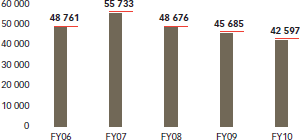
South Africa vs PNG: Employees
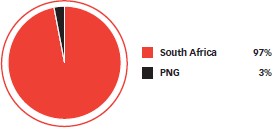
In South Africa, the company’s employee complement was 40 119 for the year (FY09: 42 278), consisting of 35 788 (89%) permanent employees and 4 331 (11%) contractors. Employee figures decreased as a result of the closure of two Virginia operations.

This indicator has been assured by PwC:
Number of employees and contractors in South Africa in FY10: 40 119 employees (35 788 permanent employees and 4 331 contractors).
South Africa: Employees

After an extensive review, Harmony announced the closure of three loss-making shafts at the Virginia operations – Merriespruit 1 and 3, and Harmony 2 in April 2010. In May 2010, a ground-breaking job preservation and profitability agreement with the National Union of Mineworkers (NUM), UASA and Solidarity was reached in respect of the restructuring at the company’s Virginia operations. Under this agreement, certain sections of Virginia’s Merriespruit 1 shaft will continue to operate on the condition that these sections do not make a loss for two consecutive months; and that total costs remained under R250 000/kg. This contained job losses to less than 1 000.
Subsequently, these Merriespruit 1 shaft sections failed to operate at a profit and a decision was made in September 2010 to cease operations. This process has commenced as per the agreement and will be finalised by the end of the second quarter of FY11.
South Africa: Employees versus contractors
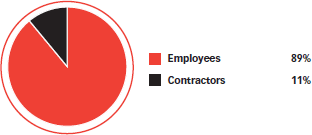
PNG: Employees versus contractors
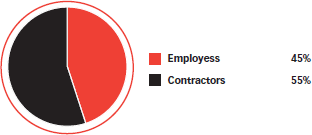
In PNG, there were a total of 2 478 employees (FY09: 3 407), of whom 1 105 (45%) were permanent employees and 1 373 (55%) were contractors. Contractors at PNG are largely construction-related and their contracts expire at different times in line with project completion. As the construction at Hidden Valley was the main reason for the large number of contractors, this number decreases as construction draws to a close.
Turnover
Harmony closely monitors its employee turnover indicators given the skills development challenge in South Africa as well as the need to develop the skills of HDSAs and women. Harmony’s total turnover for the group was 14% (FY09: 18%). This is a pleasing 4% decrease and can be attributed to the company’s range of retention initiatives.
In South Africa, the turnover level was 15% with 5 282 employees leaving the company. The main reasons for separation from the company in FY10 were voluntary retrenchments (25%), dismissals (20%) and medical incapacitation (20%).

This indicator has been assured by PwC:
Turnover level in South Africa in FY10: 15%.
In PNG, the turnover level was also 13% with 315 employees being separated from the company in FY10. The main reasons for separation were resignations (55%) and dismissals (45%).
Turnover amongst female employees was low across the group at 1% in FY10 at 1% in both South Africa and PNG. This number is not representative, however, owing to the lower numbers of female employees across the group.
Harmony initiated a strategy to attract and retain key employees in FY08 and this continued to be applied at all operations in FY10. The recruitment of more local employees, mentoring and skills development, as well as a remuneration structure review at PNG, enabled the company to attract and retain employees during the year.
South Africa: Turnover levels
(by age group and gender)
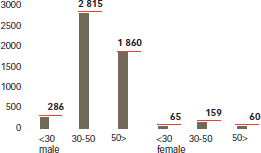
PNG: Turnover levels
(by age group and gender)
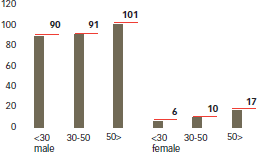
Human resources development
A key sustainability objective over the past four years has been the recruitment, development and retention of employees through the various training, development and reward initiatives. The company manages the performance and careers of employees on a regular basis throughout the group. Employees are evaluated and rewarded both for individual and for team performance on input and output for which they are directly responsible. Production bonuses all through Harmony are, however, directly related to safety performance.
Employee benefits
Employee benefits and salaries at Harmony are governed by legislation or collective bargaining agreements in South Africa. Fulltime employees, however, receive more benefits than contractors in South Africa and PNG. Other than salaries, the benefits provided to employees include: leave, annual or performance bonuses, housing/housing allowances, home ownership benefits, funeral fund, medical aid, maternity/paternity leave, disability coverage, life insurance, and provident and pension funds. Share incentive schemes are in place for management.
Human rights
Vigilance in respect of human rights is maintained by the human resources and community engagement managers at an operational level. Respect for human rights is entrenched within the company’s values and explicitly catered for in human resources policies, charters and contracts of engagement. As a South African-based company, Harmony abides by the human rights conventions of the ILO as contained within the South African Constitution.
In addition, certain human rights requirements are built into contractual arrangements when new suppliers are identified and engaged.
No incidents of discrimination were reported in South Africa or PNG in FY10. Harmony is governed by the South African constitution, within which human rights are enshrined, and relating to the prohibition of forced, compulsory or child labour. None of Harmony’s operations are at risk and no contraventions of these principles were alleged or reported in FY10.
See the discussion below on collective bargaining.
Training and development
In line with Harmony’s goal of investing in the training and development of current and potential employees, there are skills development programmes offered by the company at selected tertiary institutions.
South Africa
During the year, 30 747 of the group’s employees received some form of training at a cost of R225 million.

This indicator has been assured by PwC:
30 747 employees received training, at a cost of R225 million.
Harmony’s programmes are tailored around the training and development needs of its employees. Around 86% of the workforce in South Africa received some form of training in the areas of mining, engineering, metallurgy, ore reserve management, human resources, occupational hygiene, supervisory development, change management, leadership development and other technical and soft skills training. With the specific focus on the training and development of HDSAs to facilitate transformation, 90% of the employees trained in FY10 were HDSAs with 11% of them women.
The training and development initiatives in South Africa include Adult Basic Education and Training (ABET), skills development and learnership programmes, the Harmony Bridging School, leadership and supervisory development, as well as the provision of bursaries and study assistance to current and prospective employees.
ABET
There are six ABET centres at Harmony running full-time and part-time classes. These centres employed 40 facilitators on a full-time basis and 18 on part-time in FY10. A total of 1 955 employees attended ABET including ABET offered to people in the community in FY10 at a cost of R57 781 019.
Management engaged an external service provider, Media Works, a company specialising in ABET programmes to assist in improving the 40% ABET pass rate. Media Works assessed the ABET facilitators’ level of English communication and Maths literacy skills, assessed and moderated examinations, provided learner and facilitator workbooks as well as the learner placement assessment tools. In addition, all the ABET full-time contract facilitators have been appointed as permanent Harmony employees.
The group also has ABET training at all operations, covering ABET level 1 through to ABET level 4. Bursaries are also allocated to successful candidates in various disciplines and 28 were offered in FY10.
| Levels | Dec 2008 | June 2009 | Dec 2009 | June 2010 |
|---|---|---|---|---|
| Pre-Abet | 75% | 89% | 78% | 100% |
| ABET 1 | 42% | 72% | 47% | 69% |
| ABET 2 | 27% | 44% | 36% | 56% |
| ABET 3 | 33% | 35% | 41% | 66% |
| ABET 4 | 41% | 25% | 59% | 54% |
| All Levels | 39% | 49% | 48% | 66% |
Skills development – graduate development programme
In FY10, Harmony took part in a programme to assist with the development of unemployed tertiary institution graduates in the field of engineering (electrical and mechanical), metallurgy, geology and mining. The programme is funded by the Mining Qualifications Authority (MQA) and National Skills Fund, and is aimed at providing the graduates with practical training and exposure to the workplace. In the year under review, Harmony had 21 graduates in environmental management, engineering, mining, metallurgy and geology. Of the 21, eight have been permanently employed by the operations.
Harmony has representatives who actively participate and interact with the MQA on the various committees and sub-committees regarding skills and career development for its employees.
Bridging School
Harmony’s Bridging School supports mathematics and science education at grade 12 level for previously disadvantaged matriculants. The aim is primarily to improve the pupils’ final senior certificate results, enabling them to further their studies, obtain tertiary education and ultimately be permanently employed. A total of 20 students were selected in FY10 in the following disciplines: mining (10), engineering (5), finance (4) and human resources (1). Emphasis in FY10 was on increasing the number of learnerships within the company.
Leadership development programme
Harmony has set up a leadership development programme for a target of 480 senior employees over a period of four years. In FY10, a total of 120 employees participated in the programme which is facilitated by the University of Johannesburg and which is aimed at three different management levels, namely, executive, senior and middle. The first intake of 70 candidates was in January 2010 and feedback has been positive so far with high classroom interaction and performance.
Supervisory development programme
The supervisory development programme began in April 2009 and is facilitated by Maccauvlei Learning Academy. To date, 115 learners have attended this skills programme (72 credits at NQF Level 4) whose main purpose is to develop team leader and management skills in the first line supervisors such as shift overseers and foremen. It is expected that of the approximately 3 000 supervisors, 50% will attend this programme. In FY10, a total of 58 employees attended this programme.
Portable skills training
Portable skills training involves equipping employees, especially unskilled or semi-skilled, with skills that will enable them to find employment in other companies should the company downscale or retrench employees. These initiatives need to be aligned to the skills needs in the company’s labour-sending areas, thus creating self-employment opportunities for these employees.
Harmony’s portable skills training courses in FY10 included catering and baking, clothing manufacturing, bricklaying, carpentry, computer literacy, electrical and electrical appliance repairs, furniture making, forklift operation, house wiring, livestock farming, motor servicing of light duty vehicles, plastering, plumbing, and welding.
| Portable skills training | |
|---|---|
| Mine | Number of employees (and proxies) trained |
| Bambanani | 117 |
| Brand | 48 |
| Evander | 307 |
| Joel | 72 |
| Kusasalethu | 199 |
| Masimong | 264 |
| Tshepong | 211 |
| Unisel | 11 |
| Virginia | 49 |
| Total | 1 278 |
PNG
To address the skills needs at Harmony’s PNG operations, mentoring and skills development programmes were commenced in FY10. These programmes will also assist in the company’s objective of retaining its employees.
ABET
With PNG operations being in their early stages of mining operations and Hidden Valley having just been commissioned, there are currently only part-time ABET courses being offered. A total of 25 employees attended ABET during the year at a cost of PGK93 875. ABET at PNG will progress in due course with the development of its training programme. In FY10, PGK1 063 682 (R 2 865 977) was spent on training and development.
Skills development
Due to the current shortage of heavy equipment operators at PNG, the current locally recruited employees (LREs) from the landowner areas of Hidden Valley are being trained and mentored as from July 2010.
Leadership development programme
The leadership development programme was started in August 2010, and was initially aimed at supervisors at Hidden Valley. Key performance indicator designing, management and employee appraisal training will also begin at Hidden Valley for all managers, superintendents, co-ordinators and supervisors as part of the programme, the key objective of which is to equip all line supervisors with team management skills.
Accommodation and living conditions
Harmony’s housing strategy encompasses the promotion of home ownership as well as the integration of mining communities into local structures in South Africa.
In FY10 this strategy focused on the upgrading of hostels and the hostel de-densification project. Approximately 80% of the hostels have been converted to accommodate two people per room. In the Free State, a number of vacant hostels, as well as five occupied hostels, are being converted and have been earmarked for conversion into family units, bringing the unit total to 1 600. This project is planned over a period of five years starting from July 2010. In line with the company’s promotion of home ownership, part of the housing strategy, employees who do not reside in company hostels earn a living out or housing allowance. Harmony’s catering manager and dietician monitor and audit measures to ensure a balanced diet for mine employees.
At PNG operations, the employees are from the surrounding area and therefore live in their own accommodation.
Developing and ensuring diversity
Harmony’s policy is to recruit local employees as far as possible. However, the company’s policies and procedures ensure that there is no discrimination against foreign migrant labour. Foreign labour at Harmony’s operations comprised 28% of the total workforce in FY10 (FY09: 29%).
South Africa
Employment equity legislation and the MPRDA guide employment equity practices and initiatives in South Africa. This legislation ensures the promotion of equal opportunity through the elimination of unfair discrimination and the implementation of affirmative action with regard to women in mining and HDSAs in management. To encourage and embrace diversity within the company, a diversity management programme is in place.
The company reports its employment equity plan and progress to the Department of Labour as well as to the DMR on an annual basis.
HDSAs in management
South Africa – HDSAs in management

Harmony’s recruitment, development and retention initiatives are focused on historically disadvantaged South Africans (HDSAs) in line with the Mining Charter’s requirement that HDSA employees (including white women) make up 40% of management in South Africa by 2009. Harmony’s representation of HDSAs in management was 40% for FY10 with 315 employees (FY09: 37%).
In South Africa, 10 010 employees (28%) comprised foreign labour in FY10.
The majority of the employees in Harmony’s talent pools are HDSAs who are identified as candidates for management level jobs. These employees are then assessed, coached and mentored, and exposed to discipline-specific development panel interviews. The talent pools were presented to senior management and executives at the strategic planning session for FY11.
Harmony’s social and labour plans (SLPs) have made provision for recruiting interns from the local communities. The interns – usually qualified, though unemployed, individuals – are recruited by Harmony for a period of one year to gain practical experience. The recruitment is done by Harmony with the assistance of the local municipalities. After acquiring workplace skills, deserving candidates are offered permanent employment. There are currently five internship employees who have progressed to the management trainee ranks and this number is due to increase significantly over the next few years.
Harmony continues to implement various initiatives with the objective of meeting its SLP targets.

This indicator has been assured by PwC:
315 HDSA employees in management (40 %) in FY10 in South Africa.
Women in mining
South Africa – Women in mining
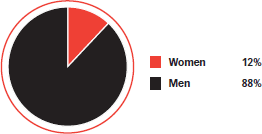
Harmony has a strategy in place to ensure the participation of women within the company; at certain operations the 10% target has been exceeded.
In line with the Mining Charter stipulation that 10% of the total workforce should consist of women by 2009, the representation of women across the Harmony group in FY10 was 12% (4 423 women) (FY09: 11%). The percentage of women in management was 16% and 9% (FY09: 8%) in the core disciplines of engineering, mining, ore reserve management and metallurgy.

This indicator has been assured by PwC:
4 423 women in mining (12%) in FY10 in South Africa.
The transformation unit facilitated the establishment of a women’s forum at every operation in FY10 to ensure the active participation of women. The objective of these forums is to empower women about workplace issues as well as to facilitate effective communication between women and management.
There is no difference between salary scales for men and women at Harmony.
PNG
Localisation
Diversity in PNG
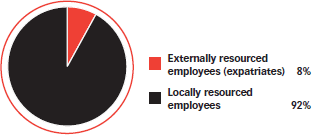
The localisation process continued at PNG whereby more locally resourced employees (LREs) were being recruited to reduce the externally resourced employees (EREs) to the approximate target of 4% by FY13. In PNG, 79 employees (8%) comprised foreign labour in FY10.
In terms of diversity and equal opportunity, PNG operations are governed by a three-year training plan which is lodged with the Department of Labour for approval in three separate documents, one for each operation: Hidden Valley JV, Wafi-Golpu JV and the exploration JV.
Under this three-year plan and for the company to have EREs, Harmony is required to ensure that the LRE employees are continuously trained and that succession is managed. The first set of plans is due to be submitted in November 2010 with subsequent approval expected in January 2011.
At Hidden Valley, a community affairs manager (a male LRE) and a PNG human resources manager (a female LRE) were appointed ahead of the 2013 succession target. This leaves only one ERE in the human resources department who is due to be succeeded by an LRE in 2014.
The succession target of less than 4% permanent EREs at PNG is on track. The leadership development programme to run in the first quarter of FY11 will ensure that the target is achieved by 2013.
Women in mining
At Hidden Valley the percentage of women is 15%, well within range of achieving the 2013 target of 17%.
Promoting sound and constructive industrial relations
Harmony recognises the right of freedom of association of all employees and contractors and adheres to collective bargaining agreements relevant to the countries of operation.
South Africa
Labour relations in South Africa are guided by the Labour Relations Act as well as by company and mine-based recognition agreements.
There are three labour unions recognised by Harmony in South Africa, namely, the National Union of Mineworkers (NUM), UASA and Solidarity. The majority of the South African workforce (86%) is unionised and a further 2% is covered by collective bargaining agreements.
South Africa: Union representation
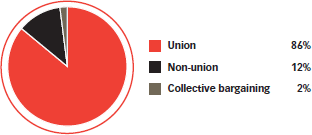
South Africa: Union representation breakdown
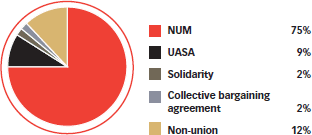
Harmony undertakes wage negotiations in a centralised industry forum under the auspices of the Chamber of Mines. Given that a two-year wage agreement was reached in the prior year, no wage negotiations took place in FY10. There was no significant industrial action in South Africa during FY10.
Nonetheless, negotiations with unions were undertaken on a wide range of issues, including:
- The suspension on taking food underground to curb illegal mining. Although controversial, this measure received the support of the union leadership and members.
- A ground-breaking job preservation and profitability agreement for sections of Virginia operations’ Merriespruit 1 shaft to continue operations under the condition that they do not make a loss for two consecutive months and that total costs remain under R250 000/kg.
These agreements resulted from an engagement process pointing to the good relationship between Harmony’s management and the unions.
Other issues currently being discussed with unions include:
- the investigation of an Employee Share Option Scheme (ESOP) for Harmony employees; and
- the establishment of a bargaining council for the gold mining industry. This has not been finalised and it is envisaged that it will be concluded by the next round of wage negotiations scheduled for mid-2011.
PNG
There are no active unions at MMJV and Harmony PNG sites. Industrial relations at the Hidden Valley site are currently carried out through the Employee Representative Committee (ERC). This ensures regular communication between management and employees through monthly ERC meetings. Programmes have been implemented to increase the ERC’s effectiveness. ERC members have been trained and coached by external consultants and issues raised at these meetings are recorded and promptly dealt with. There was no industrial action at PNG during the year.
HARMONY SUSTAINABLE DEVELOPMENT REPORT 2010